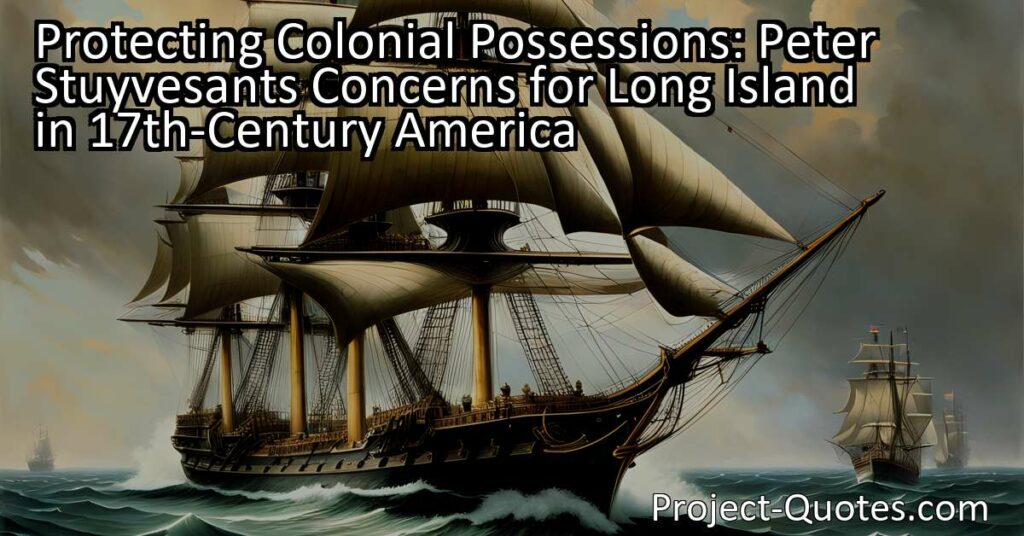The design of those commissioners, frigates and warlike force is directed rather against Long Island and these your Honors’ possessions, than to the imagined reform of New England.
Peter Stuyvesant
Protecting Colonial Possessions: Peter Stuyvesant’s Concerns for Long Island in 17th-Century America In 17th-century America, Peter Stuyvesant expressed concerns about the safety of Long Island and Dutch colonial possessions. He questioned the intentions of commissioners and their potential threat to Dutch territories. Stuyvesant emphasized the significance of defending colonial possessions, acknowledging the value they held for European nations in terms of resources, trade routes, and expanding empires. Taking proactive measures, Stuyvesant worked to safeguard Dutch interests and maintain their presence in North America. This historical incident illuminates the complexities of early colonial conflicts and the importance of protecting valuable territories.
Table of Contents
- 1 The design of those commissioners, frigates and warlike force is directed rather against Long Island and these your Honors’ possessions, than to the imagined reform of New England.
- 2 Peter Stuyvesant
- 3 Meaning of Quote – The design of those commissioners, frigates and warlike force is directed rather against Long Island and these your Honors’ possessions, than to the imagined reform of New England.
- 4 Freely Shareable Quote Image
- 5 Related
Meaning of Quote – The design of those commissioners, frigates and warlike force is directed rather against Long Island and these your Honors’ possessions, than to the imagined reform of New England.
Peter Stuyvesant’s Concerns for Long Island and the Importance of Defending Colonial Possessions
Introduction
Peter Stuyvesant, an influential figure in colonial America, expressed his concerns about the intentions of the commissioners, frigates, and warlike force in New England. In his quote, Stuyvesant suggests that the primary purpose of this military presence is not the reform of New England but rather a threat to Long Island and the possessions of his Honors. This essay will explore Stuyvesant’s concern for the safety of Long Island and the significance of defending colonial possessions in the context of 17th-century America.
Body:
1. Historical Context
To understand the implications of Stuyvesant’s quote, it is essential to delve into the historical background of colonial America during the 17th century. At that time, the region experienced immense colonization by various European powers, with the English and Dutch striving to assert territorial dominance. Stuyvesant, being the Dutch Director-General of New Netherland, was entrusted with defending Dutch colonial territories against neighboring English colonies, primarily situated on Long Island.
2. Threats to Long Island
Long Island held immense economic and strategic significance for the Dutch. With its fertile lands and access to maritime trade routes, it became a crucial outpost in their New World pursuits. Stuyvesant recognized the potential economic and political consequences if Long Island were left vulnerable to English encroachment. Consequently, he raises concerns about the intentions of the commissioners and their imminent threat to the Dutch colony’s security and prosperity.
3. The Reform of New England
While the commissioners and their accompanying military force claimed to be focused on reforming New England, Stuyvesant questions their true motivations. The concept of reform, in this context, might appear as a euphemism for expanding English influence, authority, and control over New England territories. By highlighting their potential duplicity, Stuyvesant uncovers the underlying risks that could potentially impact the Dutch colonies functioning in New Netherland.
4. Importance of Colonial Possessions
Peter Stuyvesant’s emphasis on protecting colonial possessions highlights the strategic importance that territories held within the context of 17th-century European power dynamics. Colonial possessions provided European nations with valuable resources, commercial advantages, control over trade routes, and opportunities for expanding their empires. By expressing his concerns about the safety of Long Island and the possessions under his authority, Stuyvesant acknowledges the significance of these territories and the necessity of defending them from potential rivals.
5. Response and Action
Stuyvesant’s concerns prompted him to take action to safeguard Dutch interests in New Netherland. Recognizing the possible threat posed by the commissioners and their forces, he implemented defensive measures, such as fortifying strategic locations and bolstering military capabilities. Stuyvesant’s proactive stance demonstrates his commitment to protecting Dutch colonies and maintaining the Dutch presence in North America.
Conclusion
In conclusion, Peter Stuyvesant’s quote sheds light on his concerns about the intentions of the commissioners, frigates, and warlike force in New England. By drawing attention to the potential danger facing Long Island and Dutch possessions, Stuyvesant cautions against complacency. This historical incident underscores the importance of defending colonial possessions and highlights the complexities of early colonial conflicts in 17th-century America. By better understanding Stuyvesant’s perspective, we gain valuable insights into the challenges faced by early European settlers and the evolving dynamics of power and influence in the New World.
I hope this quote inspired image brings you hope and peace. Share it with someone who needs it today!


